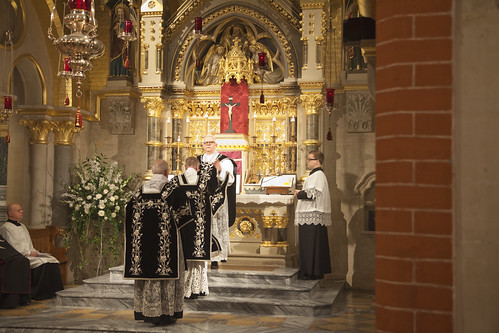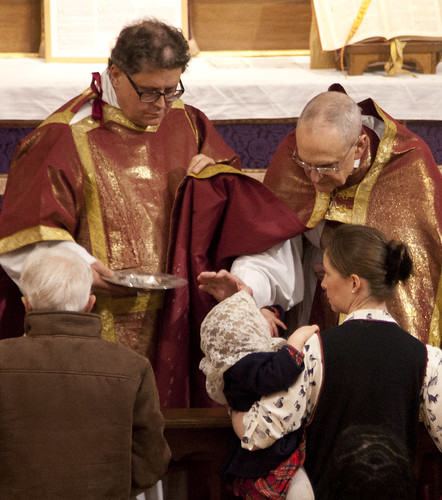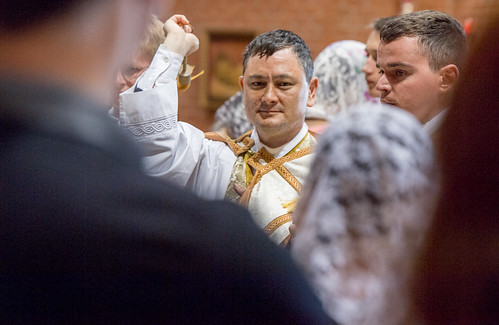Chairman's Blog
Monday Masses in London
- 2nd May: St ATHANASIUS
Missa Euge Bone, Tye
Surrexit Pastor Bonus, L’Heritier
Dum Transisset, Taverner
- 23rd May: VOTIVE MASS FOR PEACE
Missa Vidi Speciosam, Victoria
O Maria Vernans Rosa, Clemens non Papa
Christe qui Lux est Dies, White
- 6th June: WHIT MONDAY
Missa Dum Complerentur, Palestrina
Dum Complerentur, Victoria
Loquebantur Variis Linguis, Tallis
- 20th June: Octave Mass of CORPUS CHRISTI
Missa Viri Galilei, Palestrina
Viri Galilei, Palestrina
O Sacrum Convivium, Guerrero
- 4th July: Octave Mass of SS PETER AND PAUL
Missa Papae Marcelli
Credo Quod redemptor, Parsons
Adolescentes sum ego, Mundy
- 25TH July: St JAMES
Missa Simile Est Regnum, Victoria
Sancta Maria, Victoria
Ave Verum, Byrd
- 15th AUGUST: THE ASSUMPTION OF THE BVM
Missa Assumpta Est Maria, Palestrina
Ave Virgo Sanctissima, Guerrero
Ave Maria Gemma Virginum, Mouton
- 22nd August: THE IMMACULATE HEART OF THE BVM
Missa Sicut Lilium Inter Spinas, Palestrina
Ave Maria 5, Palestrina
Salve Regina a 5, Victoria
FIUV Magazine, Gregorius Magnus, now out!
Support the Latin Mass Society
Sponsorship for Royal School of Needlework Course from the Guild of St Clare
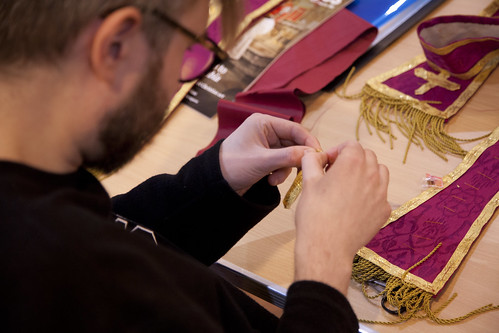 |
| One of our sponsored students, helping to make a replacement stole for a violet Low Mass set belonging to the Latin Mass Society |
 |
| A Certificate Course piece of work by the other of our current sponsored students. |
A prayer for Friday's Consecration of Russia
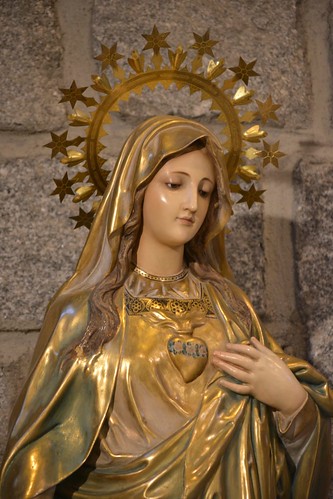 |
Prayer of Consecration to the Immaculate Heart of Mary
O Queen of the most holy Rosary, help of Christians, refuge of the human race, victorious in all the battles of God, we prostrate ourselves in supplication before thy throne, in the sure hope of obtaining mercy and of receiving grace and timely aid in our present calamities, not through any merits of our own on which we do not rely, but only through the immense goodness of thy mother’s Heart. In thee and in thy Immaculate Heart, at this grave hour of human history, do we put our trust; to thee we consecrate ourselves, not only with all of Holy Church, which is the mystical body of thy Son Jesus, and which is suffering in so many of her members, being subjected to manifold tribulations and persecutions, but also with the whole world, torn by discords, agitated with hatred, the victim of its own iniquities.
Be thou moved by the sight of such material and moral degradation, such sorrows, such anguish, so many tormented souls in danger of eternal loss! Do thou, O Mother of mercy, obtain for us from God a Christ-like reconciliation of the nations, as well as those graces which can convert the souls of men in an instant, those graces which prepare the way and make certain the long desired coming of peace on earth. O Queen of peace, pray for us, and grant peace unto the world in the truth, the justice, and the charity of Christ.
Above all, give us peace in our hearts, so that the kingdom of God may spread its borders in the tranquillity of order. Accord thy protection to unbelievers and to all those who lie within the shadow of death; cause the Sun of Truth to rise upon them; may they be enabled to join with us in repeating before the Saviour of the world: “Glory to God in the highest, and on earth peace to men of good will.” Give peace to the nations that are separated from us by error or discord, and in a special manner to those peoples who profess a singular devotion toward thee; bring them back to Christ’s one fold, under the one true Shepherd. Obtain full freedom for the holy Church of God; defend her from her enemies; check the ever-increasing torrent of immorality; arouse in the faithful a love of purity, a practical Christian life, and an apostolic zeal, so that the multitude of those who serve God may increase in merit and in number.
Finally, even as the Church and all mankind were once consecrated to the Heart of thy Son Jesus, because He was for all those who put their hope in Him an inexhaustible source of victory and salvation, so in like manner do we consecrate ourselves, and the nations of Russia and Ukraine, forever to thee also and to thy Immaculate Heart, O Mother of us and Queen of the world; may thy love and patronage hasten the day when the kingdom of God shall be victorious and all the nations, at peace with God and with one another, shall call thee blessed and intone with thee, from the rising of the sun to its going down, the everlasting “Magnificat” of glory, of love, of gratitude to the Heart of Jesus, in which alone we can find truth, life, and peace.
(Pope Pius XII, 17 Nov 1942: with the addition of the words in red).
Penance: for Catholic Answers
Presented with the imperative to “do something” for Lent, a familiar response is to “give something up.” In itself, this is a healthy enough instinct. Depending on your lifestyle, giving up alcohol, or even chocolate, can be a reminder of the nature of the season and a noticeable sacrifice. Alternatively, people think of giving up something bad, trying to overcome a habitual sin. This is laudable, but penance is the sacrifice of something good, not something bad. Catholics should be able to go beyond both kinds of “giving up.”
The imperatives of Lent in particular, and of the Christian life in general, are the eminent good works of prayer, penance, and almsgiving. These really are good works—works that earn us merit. These works will cancel out temporal punishment we would otherwise suffer in purgatory, and add to our glory in heaven, and we can offer them for the good of the holy souls in purgatory and for the conversion of sinners. Good works in this sense are possible only if we are in a state of grace (sanctifying grace), and they will themselves be done in and through God’s assisting grace (actual grace). When we do them, we may say with St. Paul, it is not we who do them, but God who does them through us (Phil. 2:13). They are in fact a gift of God to us—but when God gives us something, we really do possess it.
Server training and vestment-mending in London
We had a splendid day at St Mary Moorfields with the Society of St Tarcisius (server training) and the Guild of St Clare (vestment mending), taking place simultaneously.
The 'Latin Mass' Society: letters in The Tablet
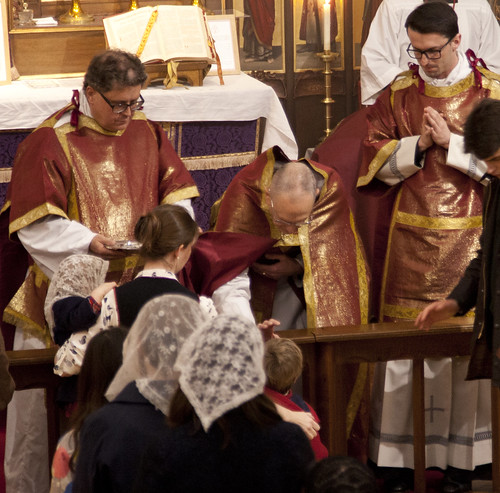 |
| Ash Wednesday. A new generation of Latin Massers. |
Although printing two letters challenging the Latin Mass Society directly, The Tablet took their time in printing my response, which appeared two editions ago (yes I've been busy too). It is the old canard about our name. The Latin Mass Society is a lot easier to understand than a few other names I could mention. The Tablet, for example: what is that all about? Did its founders really look forward to the day when it would be referred to a 'the Bitter Pill'?
Letters on 4th Feb
...While not quite accurate, it does not seem entirely misleading to speak of two rites. What is misleading – and completely inaccurate – is to refer to the “extraordinary” form as the “Latin Mass”. I find it frankly annoying that the term “Latin Mass” is so frequently used in this way, and has been adopted as a rallying cry on both sides of the current, unfortunate, liturgical conflict.
What is at issue is not only, and certainly not primarily, the use of Latin. All the post Vatican II liturgical texts – for the celebration of Mass and the sacraments, the daily Liturgy of the Hours, for ritual consecrations and blessings – were promulgated in Latin. Latin may be, and is, the language in which these rites are celebrated if and when it is appropriate to do so.
Latin is not the root cause of today’s liturgical polarisation. Please, let us agree to avoid this confusing use of the term “Latin Mass”. And, in passing, perhaps the Latin Mass Society (which I do not support, despite a personal love of Latin as a liturgical language) might consider changing its name, to represent more accurately what appear to be its own aims and ethos.
(FR) MARTIN J. CLAYTON
HOPE, DERBYSHIRE
...The congregation was mixed: English, Irish, Swiss, German. Although the form of the service was post-Tridentine as prescribed by Vatican II, the language was Latin.
JIM MALIA
TOTLAND BAY, ISLE OF WIGHT
My response.
Fr Clayton and Jim Malia (Letters, 5th Feb) are correct that the Mass loved by ‘traditional’ Catholics is not simply the Mass in Latin.
The Latin Mass Society was founded to preserve the ancient Mass in Latin, when it began to be celebrated in the vernacular in 1965, and continued to seek the preservation of the ancient Mass in Latin, when it disappeared more or less completely in 1969.
Like the names of many organisations, ours reflects the circumstances of our foundation, but it remains universally understood.
The reformed Mass has never been widely celebrated in Latin. It would be pointless to make the rites ‘short, clear’ and ‘within the people's powers of comprehension’ (Sacrosanctum Concilium 34) if, at the same time, ‘the use of the Latin language is to be preserved in the Latin rites’ (36). The inner conflict in Vatican II’s Decree on the Liturgy has been resolved, in practice, in favour of the vernacular: to pretend otherwise is to engage in make-believe.
Joseph Shaw
Chairman, The Latin Mass Society
Support the Latin Mass Society
A Post-Modern Defence of Ritual: a book review
This short book (about 100 pages) could be described as a post-modern critique of the forces that are destroying both traditional societies and the remaining traditional elements of Western civilisation. It is not unique in this project, but it is a representative example of a kind of book that has become more common in recent years, and the arguments it contains are worthy of serious consideration by conservatives approaching the issues from a rather different perspective.
I am not an expert on Han’s sources—Gadamer, Foucoult, Baudrilland, Barthes, and others—so I take Han’s arguments simply as presented in this work. They display some of the characteristics of post-modernism which make it such a frustrating area to work in: sweeping generalisations, simplistic contrasts, dubious historical claims, and inconsistencies. To give an extreme example, Han appears to believe that ancient warfare did not involve projectiles (arrows and so on), which I think would have been a surprise to anyone living at the time. To some extent, one has to go along with him and see if a sound argument can be constructed out of the impassioned and intriguing elements he presents.
Support Fr Michael Rowe of Perth, Australia
Please consider donating to the (considerable) cost of making an appeal.
Fr Rowe has a special connection with Traditional Catholics in England as until Covid made it impossible he participated in the Latin Mass Society's walking pilgrimage to Walsingham: these photos are from 2017, and were taken by John Aron.
The St Anne's community has set up a GoFundMe page here.
Details from that page:
After the retirement of the benevolent Archbishop Hickey, his successor, Archbishop Timothy Costelloe in 2018 had a secret meeting on the site of St Anne's church with the Archdiocesan Vicar General, archdiocesan employees and the parish priest of Cloverdale. Fr Rowe as Rector was not informed, nor invited to the meeting on St Anne's property but only found out about it afterwards. In October 2018, by formal decree, Archbishop Costelloe merged three former territorial parishes (including the Parish of Belmont) in which St Anne’s Church happens to be located.
Pope Francis' Roller-Coaster
 |
| LMS AGM Mass 2019; photo by John Aron |
It took some time for everyone to adjust to the violent overthrow of thirteen years’ pastoral arrangements, policies, and attitudes by Pope Francis’ Apostolic Letter Traditionis Custodes (TC), not least because of the way it was promulgated, to come into immediate effect, on a Friday. The implications needed thinking through, canon law advice needed to be considered, the practical possibilities in implementation needed to be worked out. Just as things were settling down, another document came out: the Responsa ad dubia, which presented itself as an interpretation of TC, but in fact purported to add a whole lot of new obligations. The adjustment needed for this was also considerable, exacerbated by the fact that it was promulgated a fortnight before Christmas.
Bishops and papal apologists, in their different ways, have worked like Trojans to make sense of this and to put it into practice. I don’t envy either group. Just as the implications of the Responsa seemed to have been straightened out, at least to the satisfaction (if that is the right word) of various Bishops’ Conferences, official policy has been thrown once more into reverse gear. The latest decree, applicable to the Priestly Fraternity of St Peter (FSSP), puts an entirely different spin on the whole issue of the Traditional Mass and its place in the life of the Church.

